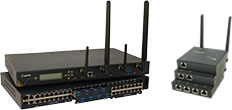
Report: Data centers fastest growing consumers of energy
By Max BurkhalterFebruary 22, 2011
According to a recent report from the U.S. Environmental Protection Agency, U.S. data centers are the fastest growing consumers of energy.
During 2006, data centers consumed nearly 6.1 billion kilowatt-hours of power. As a result, the EPA has mandated all government agencies to develop strategies for energy efficiency, with a target of 20 percent improvement by 2011. In order to reduce data power consumption, companies need to focus on three main areas - data center location, IT load and electrical efficiency.
A recent Just Means article expresses that many data centers have “yet to scratch the surface of managing the energy consumption of effiency of their centers.” Power and cooling systems currently in use are inefficient, stranded capacity rates are high and server utilization is low, according the article’s author, April Lawrence. She believes redesigning national and international power grids would be beneficial to modify augment or phase out inefficient fossil fuel plants.
The article urges companies to adopt cloud computing in order to reduce power consumption. Instead of each company having their own data center to manage servers and provide technology, many companies can simply rely on managed IT service companies, such as cloud providers. With such providers lending their physical infrastructure, such as leased space, lines or services to organizations, additional space for those companies in the cloud to have data centers is simply not needed. Thus, moving to the cloud can reduce a company’s data power consumption - a move many governmental agenices have already begun to make.
Current projections show worldwide emissions from data centers will quadruple by 2020. To avoid this, migrating desktop applications and web-based services to consolidated farms is quite beneficial.
According to a 2009 article on cloud computing, the service has benefits at every level. At the macro-level, the cloud enables “economies of scale,” by centralizing compute power. At the CIO level, cloud computing helps shift the mindset to “commoditize” computing power, and thus, drive efficencies through virtualization. At the data center level, consolidation through cloud computing allows for new standards for energy efficiency. Finally, at the research and development level, the cloud creative incentives for software engineers to create more efficient applications.
The Obama administration recently declared its intention to adopt cloud computing to reduce the number of governmental data centers. By 2015, the government hopes to shut down 800 data centers and adopt cloud computing to replace the maintenance and access those centers provided.



